新核心综合学术英语教程第一册Unit5分析解析
- 格式:pdf
- 大小:13.35 MB
- 文档页数:80
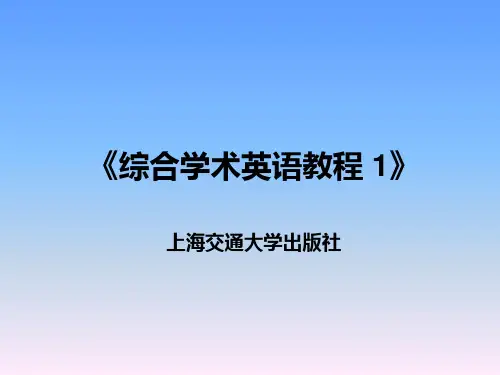
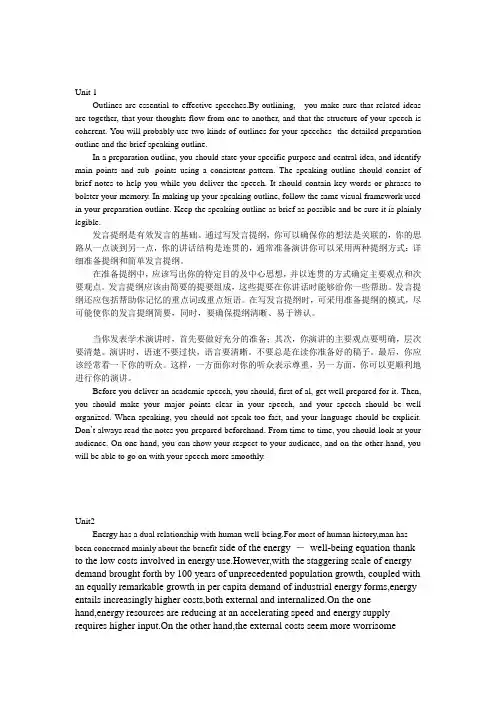
Unit 1Outlines are essential to effective speeches.By outlining, you make sure that related ideas are together, that your thoughts flow from one to another, and that the structure of your speech is coherent. You will probably use two kinds of outlines for your speeches--the detailed preparation outline and the brief speaking outline.In a preparation outline, you should state your specific purpose and central idea, and identify main points and sub--points using a consistent pattern. The speaking outline should consist of brief notes to help you while you deliver the speech. It should contain key words or phrases to bolster your memory. In making up your speaking outline, follow the same visual framework used in your preparation outline. Keep the speaking outline as brief as possible and be sure it is plainly legible.发言提纲是有效发言的基础。
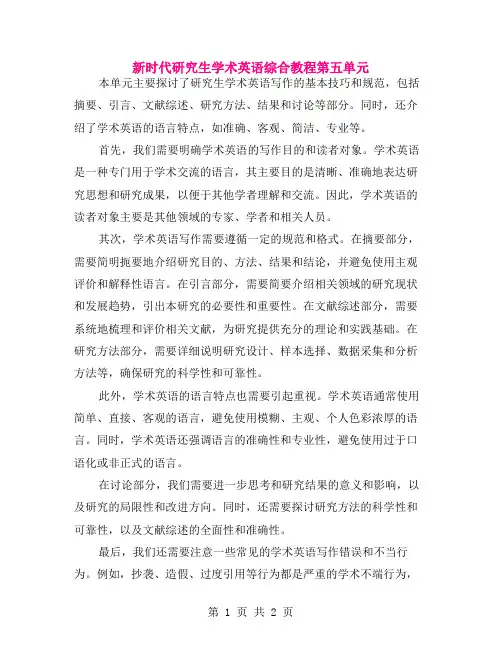
新时代研究生学术英语综合教程第五单元本单元主要探讨了研究生学术英语写作的基本技巧和规范,包括摘要、引言、文献综述、研究方法、结果和讨论等部分。
同时,还介绍了学术英语的语言特点,如准确、客观、简洁、专业等。
首先,我们需要明确学术英语的写作目的和读者对象。
学术英语是一种专门用于学术交流的语言,其主要目的是清晰、准确地表达研究思想和研究成果,以便于其他学者理解和交流。
因此,学术英语的读者对象主要是其他领域的专家、学者和相关人员。
其次,学术英语写作需要遵循一定的规范和格式。
在摘要部分,需要简明扼要地介绍研究目的、方法、结果和结论,并避免使用主观评价和解释性语言。
在引言部分,需要简要介绍相关领域的研究现状和发展趋势,引出本研究的必要性和重要性。
在文献综述部分,需要系统地梳理和评价相关文献,为研究提供充分的理论和实践基础。
在研究方法部分,需要详细说明研究设计、样本选择、数据采集和分析方法等,确保研究的科学性和可靠性。
此外,学术英语的语言特点也需要引起重视。
学术英语通常使用简单、直接、客观的语言,避免使用模糊、主观、个人色彩浓厚的语言。
同时,学术英语还强调语言的准确性和专业性,避免使用过于口语化或非正式的语言。
在讨论部分,我们需要进一步思考和研究结果的意义和影响,以及研究的局限性和改进方向。
同时,还需要探讨研究方法的科学性和可靠性,以及文献综述的全面性和准确性。
最后,我们还需要注意一些常见的学术英语写作错误和不当行为。
例如,抄袭、造假、过度引用等行为都是严重的学术不端行为,不仅会影响研究信誉,还会损害整个学术界的利益。
因此,我们需要时刻保持诚实和自律,遵循学术规范和道德准则。
总之,研究生学术英语综合教程第五单元为我们提供了学术英语写作的基本知识和规范,帮助我们更好地进行学术研究和交流。
我们应该认真学习并掌握这些知识和技能,为今后的学术研究和职业发展打下坚实的基础。

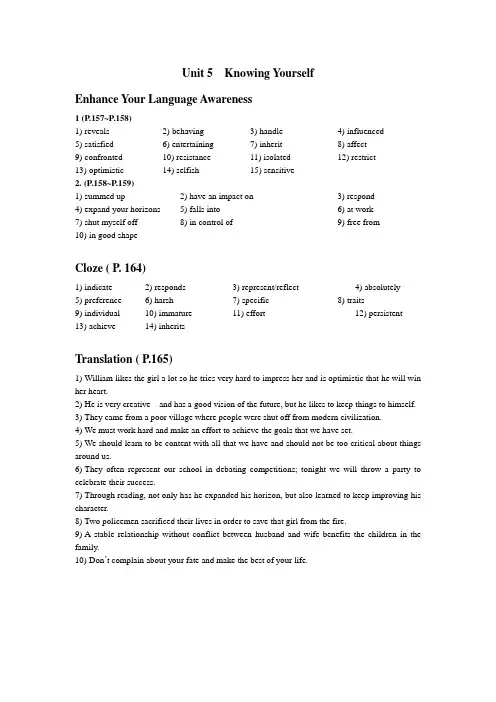
Unit 5 Knowing Y ourselfEnhance Your Language Awareness1 (P.157~P.158)1)reveals 2) behaving 3) handle 4) influenced5)satisfied 6) entertaining 7) inherit 8) affect9)confronted 10) resistance 11) isolated 12) restrict13)optimistic 14) selfish 15) sensitive2.(P.158~P.159)1)summed up 2) have an impact on 3) respond4)expand your horizons 5) falls into 6) at work7)shut myself off 8) in control of 9) free from10)in good shapeCloze ( P. 164)1)indicate 2) responds 3) represent/reflect 4) absolutely5)preference 6) harsh 7) specific 8) traits9)individual 10) immature 11) effort 12) persistent 13)achieve 14) inheritsTranslation ( P.165)1)William likes the girl a lot so he tries very hard to impress her and is optimistic that he will win her heart.2)He is very creative and has a good vision of the future, but he likes to keep things to himself.3)They came from a poor village where people were shut off from modern civilization.4)We must work hard and make an effort to achieve the goals that we have set.5)We should learn to be content with all that we have and should not be too critical about things around us.6)They often represent our school in debating competitions; tonight we will throw a party to celebrate their success.7)Through reading, not only has he expanded his horizon, but also learned to keep improving his character.8)Two policemen sacrificed their lives in order to save that girl from the fire.9)A stable relationship without conflict between husband and wife benefits the children in the family.10)Don’t complain about your fate and make the best of your life.。

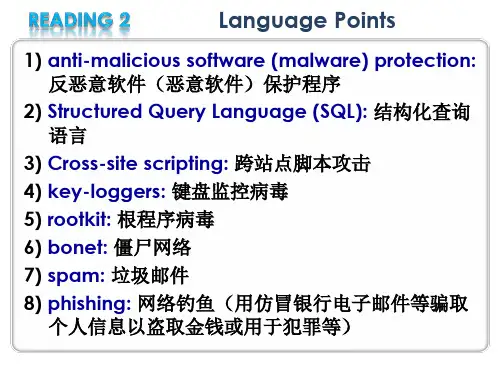
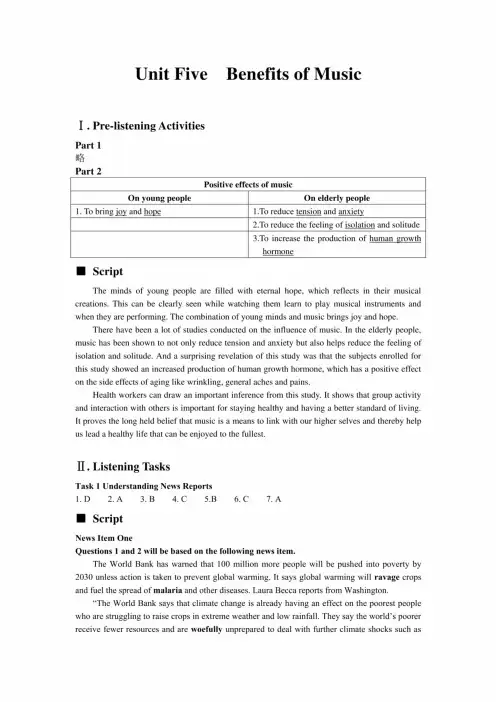
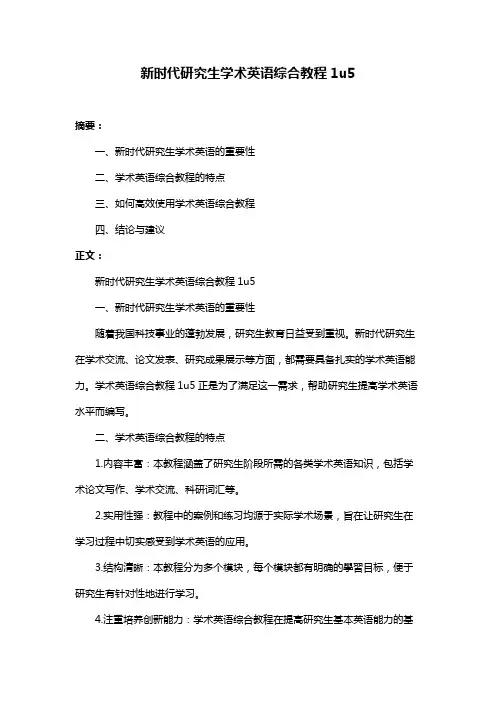
新时代研究生学术英语综合教程1u5摘要:一、新时代研究生学术英语的重要性二、学术英语综合教程的特点三、如何高效使用学术英语综合教程四、结论与建议正文:新时代研究生学术英语综合教程1u5一、新时代研究生学术英语的重要性随着我国科技事业的蓬勃发展,研究生教育日益受到重视。
新时代研究生在学术交流、论文发表、研究成果展示等方面,都需要具备扎实的学术英语能力。
学术英语综合教程1u5正是为了满足这一需求,帮助研究生提高学术英语水平而编写。
二、学术英语综合教程的特点1.内容丰富:本教程涵盖了研究生阶段所需的各类学术英语知识,包括学术论文写作、学术交流、科研词汇等。
2.实用性强:教程中的案例和练习均源于实际学术场景,旨在让研究生在学习过程中切实感受到学术英语的应用。
3.结构清晰:本教程分为多个模块,每个模块都有明确的學習目标,便于研究生有针对性地进行学习。
4.注重培养创新能力:学术英语综合教程在提高研究生基本英语能力的基础上,还注重培养其在国际学术交流中的创新能力。
三、如何高效使用学术英语综合教程1.制定学习计划:研究生可根据自身需求,制定合理的学习计划,确保每个模块都能得到充分学习。
2.结合实际案例:在学习过程中,研究生可将教程中的知识点与实际学术场景相结合,提高学术英语应用能力。
3.互动交流:鼓励研究生与他人分享学习心得,开展小组讨论,以提高学术英语的交流能力。
4.定期复习与总结:学术英语综合教程知识点繁多,定期复习与总结有助于巩固记忆。
四、结论与建议新时代研究生学术英语综合教程1u5为研究生提供了一个全面、实用的学术英语学习平台。
通过高效学习,研究生可以提升自身的学术英语水平,更好地参与国际学术交流,为我国科技事业作出更大贡献。


proclaim v.1.to make (sth.) known officially or publicly; announce 宣告;宣布;公布;申明e.g.After its independence, India was proclaimed a republic.印度独立后正式宣布成立共和国。
Britain proudly proclaims that it is a nation of animal lovers.英国自豪地宣称自己是个热爱动物的国家。
Synonym:declare2.(fml) to show (sth.) clearly; reveal 显示;表明;显露e.g.His manners proclaim him a scholar.从他的举止可以看出他是一名学者。
His accent proclaimed that he was a Scot.他的口音表明他是一个苏格兰人。
Synonym:indicatecompromise1.n. giving up of certain demands by each side in a dispute, so that an agreement may be reached which satisfies both to some extent 妥协;折中;和解e.g.Most wage claims are settled by compromise.多数增加工资的要求均以折中的方式解决。
Encourage your child to reach a compromise between what he wants and what you want.鼓励你的孩子在他想要的和你想要的之间折中和解。
2.v. to reach an agreement in which everyone involved accepts less than what they wanted at first 妥协;折中e.g.I wanted to go to Greece, and my wife wanted to go to Spain, so we compromised on Italy.我想要去希腊,但我妻子希望去西班牙,于是我们折中去了意大利。
第五单元:学术写作中的逻辑连接本单元将重点介绍学术写作中常用的逻辑连接词和句式,这些连接词和句式能够帮助学术作者更好地组织文章结构,使文章逻辑性更强,层次更清晰。
1. 逻辑连接词的作用逻辑连接词是学术写作中不可或缺的一部分,它们可以连接句子、段落,甚至整篇文章,使文章的结构更加完整和紧凑。
常用的逻辑连接词包括but, however, therefore, moreover, furthermore等,它们在学术文章中起着承接、转折、因果、并列等不同的作用,帮助作者表达观点、构建论证。
2. 常用逻辑连接词及其使用方法2.1 but和howeverbut表示转折关系,常用于连接两个对立的观点,如“It is a challenging task, but it is worth trying.”而however则表示转折或对比,一般用在句子中部分,用逗号隔开,“The weather was bad, however, we still went out for a walk.”2.2 therefore和thustherefore表示因果关系,常用于引出结论,“The exp eriment f本人led, therefore we need to make some changes.”而thus则表示结果,“The research is promising, thus it deserves further study.”2.3 moreover和furthermoremoreover用于句首,表示补充,“Moreover, there are other factors that need to be considered.”而furthermore用于句中,表示进一步的论证,“The data is consistent, furthermore, the conclusion is reliable.”3. 逻辑连接句式的应用除了逻辑连接词外,逻辑连接句式也是学术写作中常用的工具,通过适当的句式安排,可以使文章结构更加清晰和紧密。
Unit 5 Revealing nature三言两语1. Even if polluted air does not kill us, it can make us very sick.2. Then they can record their movements, or migrations (迁徙).3. Scientists do not know if the attacks are the result of anger or interest. 1. 被大自然的美所吸引,我们情不自禁地拍了许多照片。
Attracted by the nature's beauty, we couldn't help taking lots of pictures.2. 一些研究表明,在树林中散步使我们放松。
According to some studies, walking among trees makes us relaxed.核心单词[默写识记]根据汉语释义写出单词1. seed n. 种子,籽2. geologist n. 地质学家3. sample n. 样本4. ancestor n. (动物的)原种,祖先5. decline v. 减少6. blame v. 责怪,指责;把……归咎于7. giant adj.巨大的,特大的8. link v. 把……联系起来;连接9. centimetre n. 厘米10. root n. 根11. fungus n. 真菌(复数fungi)12. fungal adj.真菌的13. cybercrime n. 网络犯罪14. iguana n. 鬣蜥(一种大型热带美洲蜥蜴)熟词生义1. (2020·天津卷)We offered to give Sharon a ride home, but she declined, saying that she felt like walking.拒绝,谢绝2. (2019·天津卷)Most food webs, for instance, consist of many weak links rather than a few strong ones.环节3. (江苏卷) Now similar concerns are being raised by the giants that deal in data, the oil of the digital age.巨头4. After the quarrel Sue remained cold and distant.冷淡的,疏远的高频短语短语应用1. share... with... 和……分享……2. be crowded with 挤满……;充满……3. be regarded as被认为是……4. serve as用作;充当5. answer the call 响应号召6. date back to追溯到,始于7. at the same time同时8. be similar to与……相似9. be native to 源于……的,原产于……10. do research on研究……11. be harmful to 对……有害[语境运用1]填入一个适当的词1. You can tell from his dark eyes that he isn't native to China.2. The vase is valued at $3,000,000 and it dates back to the Ming Dynasty.3. Freezing winter is harmful to orange trees.4. When you look at their new system, ours seems very oldfashioned by contrast.5. The basic design of the car is similar to12. by contrast相比之下13. communicate with和……交流14. drive away把……赶走that of earlier models.[语境运用2]填入一个适当的词Being admitted into a medical school was regarded 1. as one of my happiest things.I was crowded 2. with excitement. My father led to my desire to become a physician. Seeing him serve 3. as a hero inspired me. He often shared stories of how medical care saved patients' lives 4. with me.教材原句背诵句式仿写应用1. 现在分词短语作后置定语What's more, he had recently received a letter from his father predicting that he would be “a disgrace to yourself and all your family”.正在那里建造的房子是我的。
大学英语新理念综合教程1unit5大学英语新理念综合教程Book ISection I Lead-inWatching/Speaking/ListeningCinema Time (Or listen to the tape ) Family album u.s.a22-1 (Introduction of the film)Nigel Cole directs the feel-good comedy Calendar Girls, based on the true story of a group of working-class British housewives who became overnight celebrities by posing for a nude calendar in order to raise more than 500-thousand pounds for a new leukemia unit. The film follows the adventures of best friends Chris Harper (Helen Mirren) and Annie Clarke (Julie Walters), both members of the charitable Rylstone Women's Institute in North Yorkshire. After Annie's husband John (John Alderton) succumbs to leukemia, the friends are motivated to take some action. They convince the group to craft a tastefully nude calendar featuring the usual ladies' activities of gardening and baking, as photographed by the young amateur Lawrence (Philip Glenister). Despite the disapproval of the Institute's leader Marie (Geraldine James), the calendar quickly becomes a best-seller and leads the group to Hollywood. Ciaran Hinds appears as Chris' husband Rod Harper.A watching(1).Cinema Time (Or listen to the tape )(2).Fill in the blanks according to the film.--He?s a little that crow. He will have all theif we don't do something.--Something we ne ed to have a little… a little about Annie.--Don't me.--Hey, come here. Hey, hey, I?m not leaving you. You girl. At least I hope not.--So, em…You know, what is it he?s got?--He says he?s go nna call it Saddam Hussein.--You should ____________ us. I?m your oldest friend. You should have told me the _________ you found out.--I did. No big hoo-ha, though, ok?--Ok.--It?ll just make it ________ for him to get back to________ wh en he gets out, you know. And the ________ are clear and… and everything.B. speakingJane: Hello, Mary, nice to see you here.Mary: Hi, Jane, glad to meet you, too. Long time nosee! How are you recently?Jane: Fine, thanks! I came back from Japan yesterday.Mary: Really? So you mustn?t know anything aboutLinda?Jane: I?m afraid not. What?s wrong with her?Mary: It is said that she has got cancer.Jane: Oh my God! I couldn?t believe it! Do you stillremember how strong she was when we wereat the college?Mary: Yeah, of course I do. But now…Jane: What a pity!Mary: I …m going to visit her tomorrow. Will you gowith me?Jane: Good idea! Where and when do we meet?Mary: Let?s make it 9 o?clock am, at the gate of thehospital.Jane: Good! See you tomorrow.Mary: See you!Sample TalkWhat Does a Patient Need Most?Student A: In my opinion, a patient is likely to be depressed easily when he has serious problem. Besides the m edicine, what he needs most is people?s care. Take my uncle as an example,when he knew that he had got lung cancer, he was so sad that he even lost the hope to live. But later, he came to realize that his family, his friends even the people who only knew him expected he could get recovery soon, he began to be hopeful again and always smiled, and now, he is almost cured. So, in my mind, people?s care is the most important. What do you think about it?Student B:yes, you are right, but in my opinion, that ?s not enough. What he needs most should be the optimistic mind, it means he must have the strong mind and be active to fight with illness. It was said God only helps those who help themselves.Student A: Yes, I do agree. In one word, if we were ill, not only the medicines do we need, but also the care from the people and the strong mind.Student B:That?s right. But let?s pray everybody could be healthy forever.C. listening(1). Listen to the following sentences twice and decide whether the following statements are True (T) or False (F).1.( F ) Miss Green didn?t go to work yesterday because she had a bad cough.2.( F ) Mr. Baker went to see his daughter last week.3.( T ) Mr. West had some problems with his sleeping..4.( T ) Dr. Green is a dentist.5.( F ) Not all dentists have a lot of responsibility.(2). Listen to the following short conversations twice and choose the best answer to each question you hear on the tape.1.( C ) What does John want from Eveline?A. Tissue.B. Aspirin.C. Both A and B.D. A piece of paper.2.( D ) Which statement is NOT mentioned about John?A. He has a fever.B. He is sneezing.C. He has a headache.D. He has a cough.3.( D ) What does Eveline advise John to do?A. To see a doctor.B. To go home and have a good rest.C. To take this afternoon off.D. All of the above.4.( C ) Why doesn?t John take the sick leave?A. Because he has an interview later.B. Because he is afraid his boss will criticize him.C. Because he 's already behind schedule.D. Because he is having a meeting.5.( B )what does “putting him on ”mean?A. BelievingB. CheatingC. BeatingD. Dressing him(3). Listen to a short passage three times and fill in the blanks with themissing words you hear on the tape.Eating healthily is important for as well as their parents. When parents have poor eating , their children usually do, too. After all, children eat the same way as their parents. When parents eat food, the children will learn to enjoy it, too.Then they will good eating habits. Doctors suggest parents give their children healthier food such as fruit, and juice.Everyone wants to live a , healthy life. We know that the food we eat (影响) us in different ways. For example, doctors believe that fruit and vegetables can really people from many different . On the other hand, animal fat can cause (引起) diseases. We can change our eating habits now and many years of healthy living.Section II ReadingText A & related exercisesA brief introduction (background information)1.BackgroundSubhealthSubhealth(亚健康)is a state between good health and illnesses. It does not involve organ dysfunction(机能障碍)but implies gradual bodily deterioration(恶化)(which is often referre d to as “the third state” or “gray state”). Subhealth is closely linked to your physical well-being, psychological state, as well as imbalances in social relationships and environment-related health problems. People with subhealth often suffer from fatigue, neck/back aches, stress overload, excessive anxiety, sleeping disorders and addictive habits.The most severe cases may even exhibit suicidal tendencies (自杀倾向)or anti-social(反社会)behavior. Subhealth induces negative emotions, reduces vigor, weakens your immune system (免疫系统), and jeopardizes(危害)your personal health. Employees suffering from subhealth often cost enterprises and institutions quality of work, operational efficiency and positive work attitude. This may in turn cause damage to customer relationship and corporate image, and as importantly, the latent medical cost may be considerable.Subhealth victims are abundant in developed and highly competitive societies, and thenumber of affected people is rapidly increasing. A recent survey by the World Health Organization (WHO) indicated that 75% of the world's urban population are suffering from subhealth. SUBHEALTH and AIDS are ranked as the two most threatening health risks of the 21st century, according to WHO. Findings by China Health Care Science Technology Society, which covered 16 Chinese provinces/cities with a population of over 1 million, showed similar trends. In the study, Beijing, Shanghai and Guangdong reported significantly higher number of subhealth residents, representing 75.31%, 73.49% and 73.41% respectively of the cities' population. In May 2005, the Third International Conference on Health Preservation also found only 15% of the mainland Chinese measuring up to the WHO health standards, and about 85% of the national population suffered from subhealth!Incidents of subhealth are most prominent among the intellectuals and business executives, affecting more than 70% of the group. Subhealth syndrome(征兆)also appears in over half of the white-collar professionals engaged in highly competitive fields (such as information technology, banking and finance, accountancy, retailing, advertisement, and media), as well as in data processing, sales and R&D jobs. In addition, over half of the middle age group suffers from subhealth. Women aged between 30 and 60 are also a vulnerable(易受攻击的), especially when they reach menopausa(绝经期). Such emotional distress and physical changes may cause subhealth. These statistics point to white collar workers being possibly the most vulnerable group subjected to subhealth threat. Hence, proactive measures should be taken to prevent subhealth.2. Nine Major Risks of SubhealthOur self-administered SubHealth Quotient (SHQ) instrument measures the extent to which the respondents are affected by the following nine categories of risks:Chronic Fatigue Syndrome (CFS)CFS is a long-term fatigue status which is caused by many sources, including ambiguous pathological causes. The main symptoms may include physical exhaustion (which cannot be alleviated simply by resting), Cachexia, limb aches, and deteriorating memory.Dietetic DisorderUndesirable dietetic habits, such as dietetic immoderation and intake of unhealthy food items, may cause an inadequate supply of the necessary daily nutritional intake. These can lead to the aging of your body cells, malfunctioning of your immune system, gastrointestinal problems and other repercussions.Muscular DysfunctionExcessive repetitive use of the muscles may cause wrist injury to the user. In addition, sitting for long hours or improper postures can lead to spinal problems, which can cause other health-related issues such as back/neck aches, stiffness of waist and leg, numbness in the limbs, and maybe even paralysis.Sleeping DisturbanceThis refers to abnormality in sleeping patterns in both quality and quantity, such as hypersomnia (excessive sleepiness) or sleeping insufficiency. Sleeping disturbance is medically classified into three types: sleep abnormity; sleep-related problems (including sleepwalking, sleeping lightly, nightmare or snoring), and insomnia. Insomnia and sleeping insufficiency are the most common symptoms of sleeping disturbance. If untreated, it can severely endanger your physical and psychological health.Emotional DisturbanceEmotional disturbance is caused by a myriad of factors. It poses a significant risk to one's psychological well-being. A person suffering from emotional disturbance is often irritable, stressful, pessimistic, anxious, tense and experiences uncontrollable emotions.Social Relationship ImbalanceSocial support reduces the negative emotions resulting from stress, diminishes the adverse effect of pressure on health and provides avenues to alleviate stress. Research has indicated that social support can mitigate the negative emotional feeling and other psychological impact on individuals. Social relationship imbalance can make it difficult for a person to bear the pressure alone, causing emotional or social relationship problems which can subsequently lead to subhealth.Stress OverloadWe often experience tension and depression, which can adversely affect our physical, psychological, and social well-beings. Prolonged periods of stress can weaken our immune system, which may result in constipation or diarrhea, insomnia, lassitude, headache, poor memory, short attention span, shortness of breath, obesity or rapid loss of body weight, muscular tension, depression, anxiety and increased sensitivity to pain.Karoshi(过劳死)Karoshi is a severe subhealth status caused by several factors like extended period of overtime work, excessively high work intensity and psychological overload. The accumulation of these inducements may lead to other more severe latent diseases which may even cause death, if no proper treatment is giventimely.Sick Building Syndrome (SBS)Environmental factors (like indoor pollution, poor air circulation, improper indoor temperature, humidity, lighting or sound) may cause health damage to occupants of the building. These may in turn cause a series of uncomfortable symptoms such as sensitive nose, pharynx or throat, headache, fatigue, hypersomnia and asthma.2.Words and Expressions1.borderline n. line that marks a border 边界线; 国境线; 分界线e.g.The borderline between informal language and slang is hard to define.口语和俚语之间的分界线是很难确定的。